The Irish Farmers Journal learned this week of British Government plans in relation to trade in agricultural products after Brexit in the event of no deal.
It makes for difficult reading for Irish farmers and here is what it will mean sector by sector.
Irish dairy exports were worth €4bn to the Irish economy in 2018, with just over a quarter (26%) of exports going to the UK. The main Irish export to the UK is cheddar, which accounts for €800m of the €4m total of Irish dairy exports.
The UK is planning to impose full WTO tariffs in what it considers sensitive sectors, ie where there is substantial UK production in an area that would be undermined by cheap imports.
As the UK is a big cheddar producer and exporter in its own right, the likelihood is that full WTO tariff would be applied. In that case, Irish cheddar, which is currently worth approximately €3,000t, would have the WTO tariff of €1,671t applied, increasing its cost on the UK market to €4,671t.
Impact
The impact of this would be to hit dairy prices in the Republic of Ireland, though with the industry already selling 75% of its output outside the UK and 40% outside the EU, it is likely that alternative markets could be developed in the medium term.
For dairy farmers in the North, 33% of whom send their milk south for processing, it would put an end to that business.
However, with sufficient drying capacity in Northern Ireland (NI), milk could be processed locally and sold as powder. It is likely that this would reduce the value in pence per litre paid to farmers, though in time they could exploit the cheddar opportunity previously filled by Republic of Ireland exporters.
Verdict – Survival but at a cost on the island of Ireland.
The UK market takes 56% of Irish pig exports and 466,000 pigs went north last year for processing. Irish pigmeat is sold at global market prices so if the UK was to establish a tariff-free quota on pigmeat, then Ireland could still compete in the UK market.
If they impose full WTO tariff, then it would effectively exclude Irish pigmeat. However, as it is produced at around global market price, after a period of horrendous disruption alternative markets are likely to be found, especially in China if as forecast demand grows there in the second half of this year.
If the full WTO tariff is imposed on live pigs then the movement of pigs to the north would cease after Brexit. For the industry in the north, the issue will be getting non-EU health certificates recognised in other export markets which is likely to take some time and in the process frustrating exports.
Verdict – Again survival but at a cost with major market disruption.
A no-deal Brexit will have opposite effects either side of the Irish border for sheep farmers. The UK is the third-biggest exporter of sheepmeat in the world after Australia and New Zealand with the main market being the EU.
Also, Northern Ireland sent half its lamb crop (423,000) across the border for processing in 2018. This would all end with the application of WTO tariffs in the event of no-deal, and in addition the UK market will be committed to accepting a huge tranche of the New Zealand (NZ) lamb quota that it brought into the EU when they joined in 1973.
Republic
South of the border, it is the opposite picture as with the UK effectively out of the EU market and perhaps 100,000t of the NZ lamb quota gone with the UK, there will be considerable market opportunity for Irish sheepmeat exports in the EU, particularly as the EU was already a net importer of sheepmeat when the UK was a member.
Verdict – Wipeout for Northern Ireland, opportunity for Republic of Ireland.
A proposal by the UK to create a tariff-free or low-tariff quota, similar to its annual import requirement for beef, represents very bad news for Irish beef exports.
The UK produces approximately 70% of the beef that it consumes, with three-quarters of the 30% that is imported coming from Ireland. British and to a slightly lesser extent Northern Irish farmers get approx a 10% premium on the Irish price.
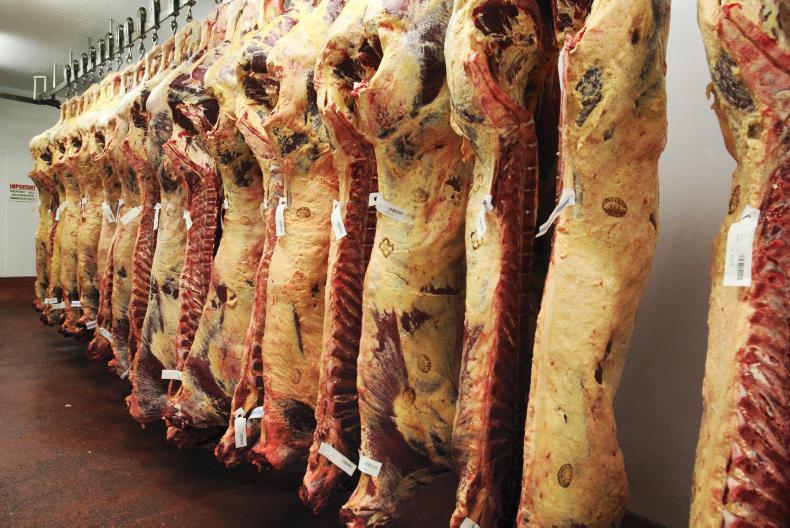
Irish beef would be going head to head with Brazilian beef where the price is currently €2.20/kg.
In the event of a tariff-free quota post-Brexit, then the 300,000t of UK beef import currently supplied by the EU will be open to all beef exporting countries in the world and will be an attractive market for Brazil, Argentina and Uruguay who between them exported 250,000t of beef to the EU in 2018.
South America
Argentina and Brazil produce similar beef to EU R3 steers for €220/kg and this will displace Irish beef as the preferred import for much of the UK’s import requirements.
The problem for Irish farmers is that unlike dairy or pigmeat, world market prices are so far below Irish prices that alternative markets cannot be developed outside the EU for anything but a tiny fraction of production. This means that Irish exports destined for the UK will go to the EU, collapsing prices there as well as in Ireland.
Northern Irish and British beef will still command a premium over imports and if the imports are really cheap coming from Brazil or Argentina, the premium could rise to 15% or 20%, much more than the 10% premium on Irish imports.
However, even a 20% premium on beef from a carcase that is produced at €2.20/kg would represent a serious fall in British beef prices
Verdict – Irish beef price will collapse, NI and Britain will also collapse but to a lesser extent because of Red Tractor (UK branding) premium.
Navigating global trade conference 15 March
The Irish Farmers Journal announced this week in partnership with Grant Thornton and as part of an EU Citizens dialogue, a "Navigating Global Trade" conference to be held in the RDS and themed "Beyond Brexit".
It will address these issues and explore what the prospects are for trade in Irish agri produce after Brexit. It will be led by European Commissioner for Agriculture Phil Hogan, with a strong line-up of international and national speakers and we will feature speaker profiles in next week’s print edition of the Irish farmers Journal and online.
Click here to register for the Navigating Global Trade conference.
The Irish Farmers Journal learned this week of British Government plans in relation to trade in agricultural products after Brexit in the event of no deal.
It makes for difficult reading for Irish farmers and here is what it will mean sector by sector.
Irish dairy exports were worth €4bn to the Irish economy in 2018, with just over a quarter (26%) of exports going to the UK. The main Irish export to the UK is cheddar, which accounts for €800m of the €4m total of Irish dairy exports.
The UK is planning to impose full WTO tariffs in what it considers sensitive sectors, ie where there is substantial UK production in an area that would be undermined by cheap imports.
As the UK is a big cheddar producer and exporter in its own right, the likelihood is that full WTO tariff would be applied. In that case, Irish cheddar, which is currently worth approximately €3,000t, would have the WTO tariff of €1,671t applied, increasing its cost on the UK market to €4,671t.
Impact
The impact of this would be to hit dairy prices in the Republic of Ireland, though with the industry already selling 75% of its output outside the UK and 40% outside the EU, it is likely that alternative markets could be developed in the medium term.
For dairy farmers in the North, 33% of whom send their milk south for processing, it would put an end to that business.
However, with sufficient drying capacity in Northern Ireland (NI), milk could be processed locally and sold as powder. It is likely that this would reduce the value in pence per litre paid to farmers, though in time they could exploit the cheddar opportunity previously filled by Republic of Ireland exporters.
Verdict – Survival but at a cost on the island of Ireland.
The UK market takes 56% of Irish pig exports and 466,000 pigs went north last year for processing. Irish pigmeat is sold at global market prices so if the UK was to establish a tariff-free quota on pigmeat, then Ireland could still compete in the UK market.
If they impose full WTO tariff, then it would effectively exclude Irish pigmeat. However, as it is produced at around global market price, after a period of horrendous disruption alternative markets are likely to be found, especially in China if as forecast demand grows there in the second half of this year.
If the full WTO tariff is imposed on live pigs then the movement of pigs to the north would cease after Brexit. For the industry in the north, the issue will be getting non-EU health certificates recognised in other export markets which is likely to take some time and in the process frustrating exports.
Verdict – Again survival but at a cost with major market disruption.
A no-deal Brexit will have opposite effects either side of the Irish border for sheep farmers. The UK is the third-biggest exporter of sheepmeat in the world after Australia and New Zealand with the main market being the EU.
Also, Northern Ireland sent half its lamb crop (423,000) across the border for processing in 2018. This would all end with the application of WTO tariffs in the event of no-deal, and in addition the UK market will be committed to accepting a huge tranche of the New Zealand (NZ) lamb quota that it brought into the EU when they joined in 1973.
Republic
South of the border, it is the opposite picture as with the UK effectively out of the EU market and perhaps 100,000t of the NZ lamb quota gone with the UK, there will be considerable market opportunity for Irish sheepmeat exports in the EU, particularly as the EU was already a net importer of sheepmeat when the UK was a member.
Verdict – Wipeout for Northern Ireland, opportunity for Republic of Ireland.
A proposal by the UK to create a tariff-free or low-tariff quota, similar to its annual import requirement for beef, represents very bad news for Irish beef exports.
The UK produces approximately 70% of the beef that it consumes, with three-quarters of the 30% that is imported coming from Ireland. British and to a slightly lesser extent Northern Irish farmers get approx a 10% premium on the Irish price.

Irish beef would be going head to head with Brazilian beef where the price is currently €2.20/kg.
In the event of a tariff-free quota post-Brexit, then the 300,000t of UK beef import currently supplied by the EU will be open to all beef exporting countries in the world and will be an attractive market for Brazil, Argentina and Uruguay who between them exported 250,000t of beef to the EU in 2018.
South America
Argentina and Brazil produce similar beef to EU R3 steers for €220/kg and this will displace Irish beef as the preferred import for much of the UK’s import requirements.
The problem for Irish farmers is that unlike dairy or pigmeat, world market prices are so far below Irish prices that alternative markets cannot be developed outside the EU for anything but a tiny fraction of production. This means that Irish exports destined for the UK will go to the EU, collapsing prices there as well as in Ireland.
Northern Irish and British beef will still command a premium over imports and if the imports are really cheap coming from Brazil or Argentina, the premium could rise to 15% or 20%, much more than the 10% premium on Irish imports.
However, even a 20% premium on beef from a carcase that is produced at €2.20/kg would represent a serious fall in British beef prices
Verdict – Irish beef price will collapse, NI and Britain will also collapse but to a lesser extent because of Red Tractor (UK branding) premium.
Navigating global trade conference 15 March
The Irish Farmers Journal announced this week in partnership with Grant Thornton and as part of an EU Citizens dialogue, a "Navigating Global Trade" conference to be held in the RDS and themed "Beyond Brexit".
It will address these issues and explore what the prospects are for trade in Irish agri produce after Brexit. It will be led by European Commissioner for Agriculture Phil Hogan, with a strong line-up of international and national speakers and we will feature speaker profiles in next week’s print edition of the Irish farmers Journal and online.
Click here to register for the Navigating Global Trade conference.





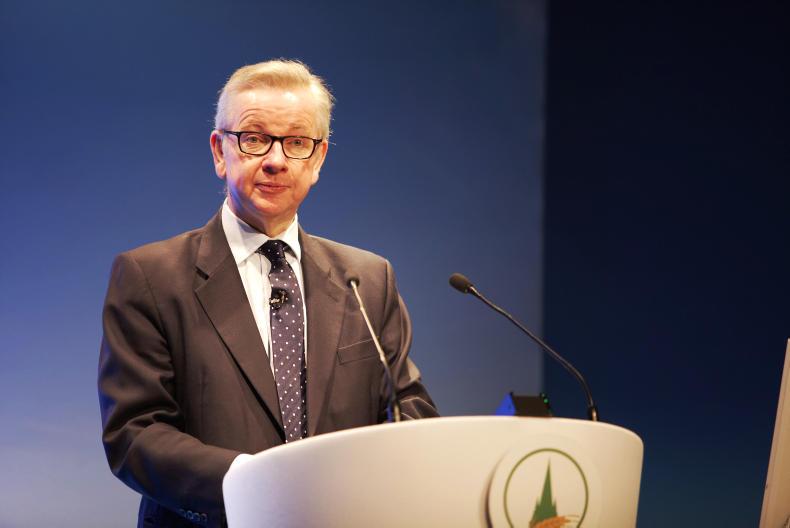
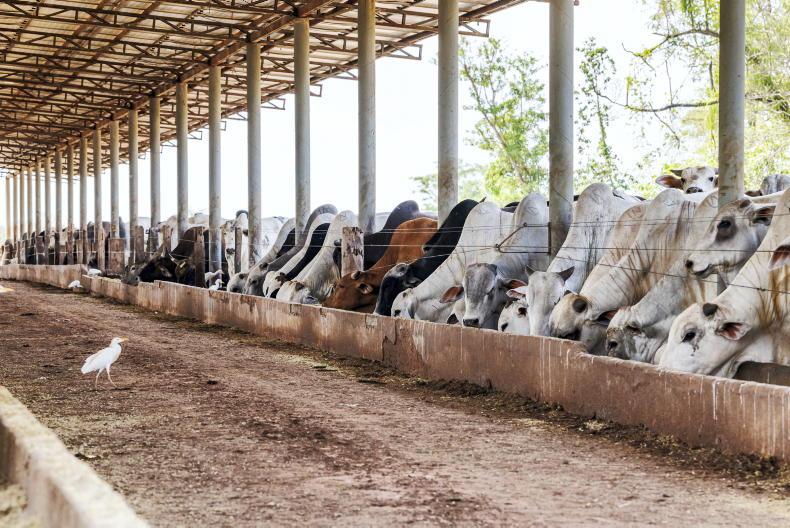

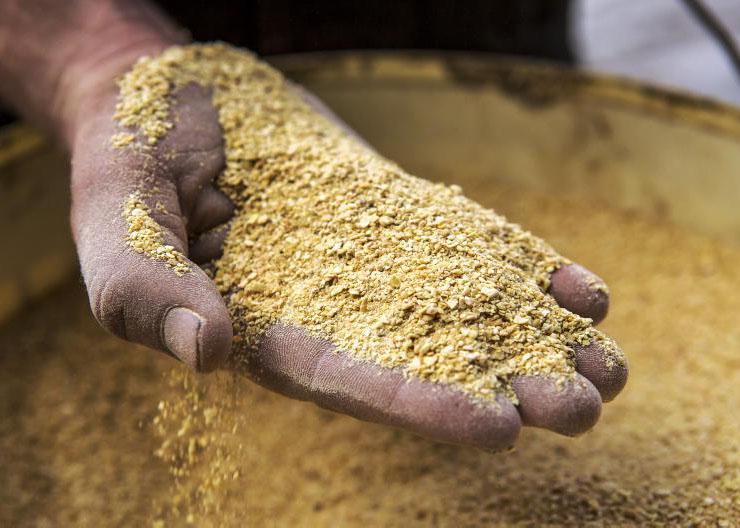
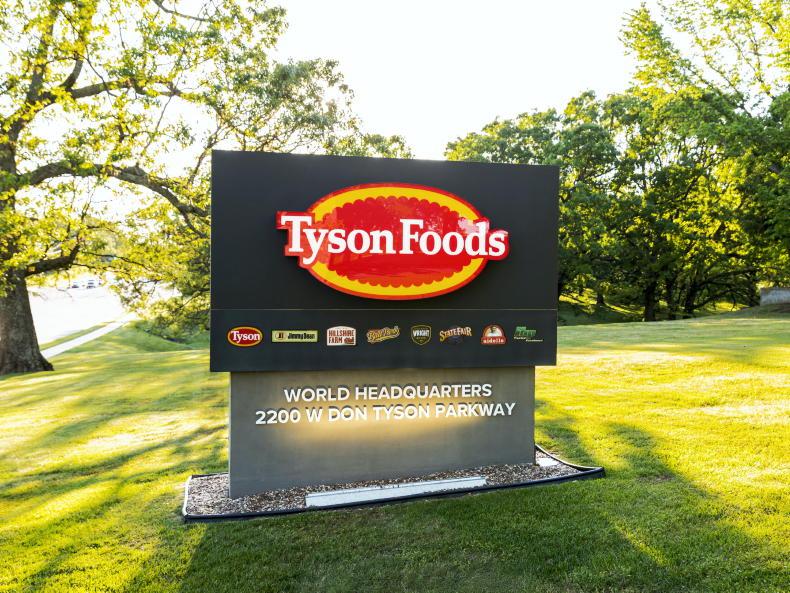
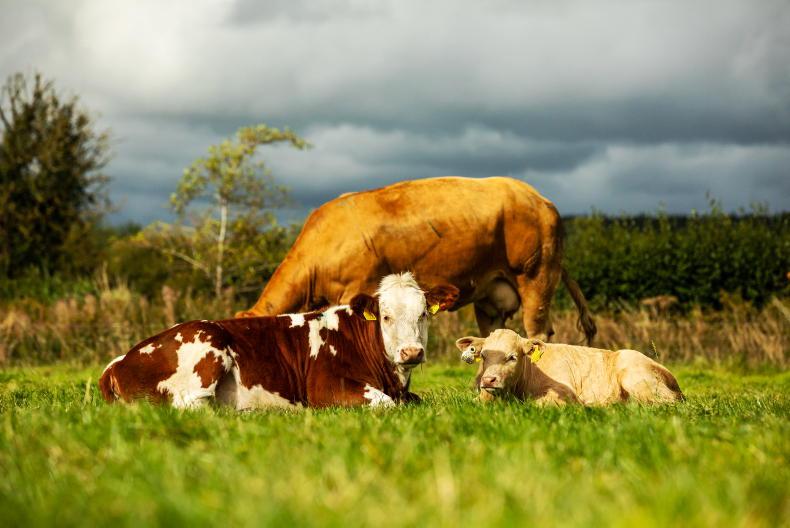
SHARING OPTIONS